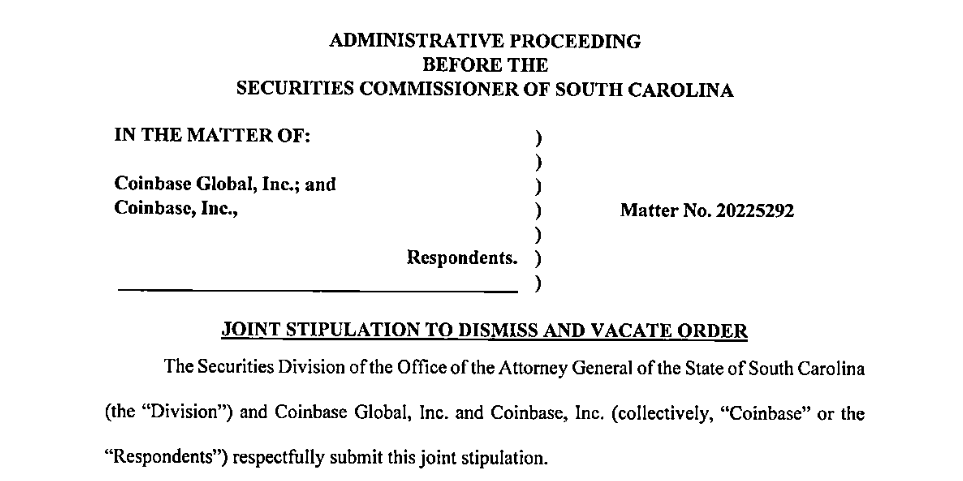South Carolina has recently become the newest US state to withdraw its lawsuit against cryptocurrency exchange Coinbase regarding its staking services, which claimed that the exchange was offering unregistered securities.
The lawsuit was officially dismissed through a mutual agreement between Coinbase and the state’s Attorney General’s securities division on March 27.
“South Carolina has now joined Vermont in dropping its baseless staking lawsuit against Coinbase,” stated the company’s chief legal officer, Paul Grewal, in a post on X on March 27.
“This is a victory not just for us, but for consumers across the nation, and we hope it sets a precedent for the remaining states that impose restrictions on staking.”

Joint stipulation from the Attorney General and Coinbase. Source: South Carolina Attorney General
On June 6, 2023, South Carolina and Vermont were among ten US states that initiated legal action against Coinbase’s staking services, coinciding with the day the federal securities regulator filed its lawsuit against the exchange.
The Securities and Exchange Commission officially dropped that case on February 27, 2025.
The eight other states that filed similar enforcement actions as South Carolina are Alabama, California, Illinois, Kentucky, Maryland, New Jersey, Washington, and Wisconsin.
Grewal expressed hope that other states would take a similar path and noted that residents in South Carolina lost an estimated $2 million in staking rewards due to the lawsuit.
“The 52 million Americans who own cryptocurrency deserve sensible consumer protections and clear guidelines,” he remarked. “We commend South Carolina for advocating for justice and hope the remaining states with staking bans will take notice.”
New Legislation for Bitcoin Reserves in South Carolina
In addition, on March 27, a state lawmaker introduced the “Strategic Digital Assets Reserve Act of South Carolina,” which could permit the state treasurer to invest up to 10% of specific state funds in cryptocurrencies like Bitcoin (BTC).
Unlike most state-level crypto reserve proposals, this bill, introduced by Rep. Jordan Pace, specifically mentioned Bitcoin multiple times while outlining the Strategic Digital Assets Reserve it aims to create.

Source: Jordan Pace
This legislation allows South Carolina’s treasurer, currently Curtis Loftis, to create a Bitcoin reserve capped at no more than 1 million Bitcoin — a threshold that the US federal government is also eager to reach with its newly formed Strategic Bitcoin Reserve.
The treasurer would be authorized to incorporate Bitcoin into South Carolina’s General Fund, the Budget Stabilization Reserve Fund, or any other investment fund they oversee.
Related: Coinbase requests FOIA to determine the costs of the SEC’s ‘war on crypto’.
While the bill does not reference stablecoins, non-fungible tokens, Ether (ETH), or any other crypto assets, it states that the Strategic Digital Assets Reserve would not be restricted solely to Bitcoin.
According to Bitcoin Law, 42 Bitcoin reserve bills have been proposed at the state level in 19 states, with 36 of those still active.
Earlier this month, the US President signed an executive order to establish a Strategic Bitcoin Reserve and a Digital Asset Stockpile, which will initially utilize cryptocurrencies seized in government criminal cases.
Magazine: Comeback 2025: Is Ethereum positioned to rival Bitcoin and Solana?
